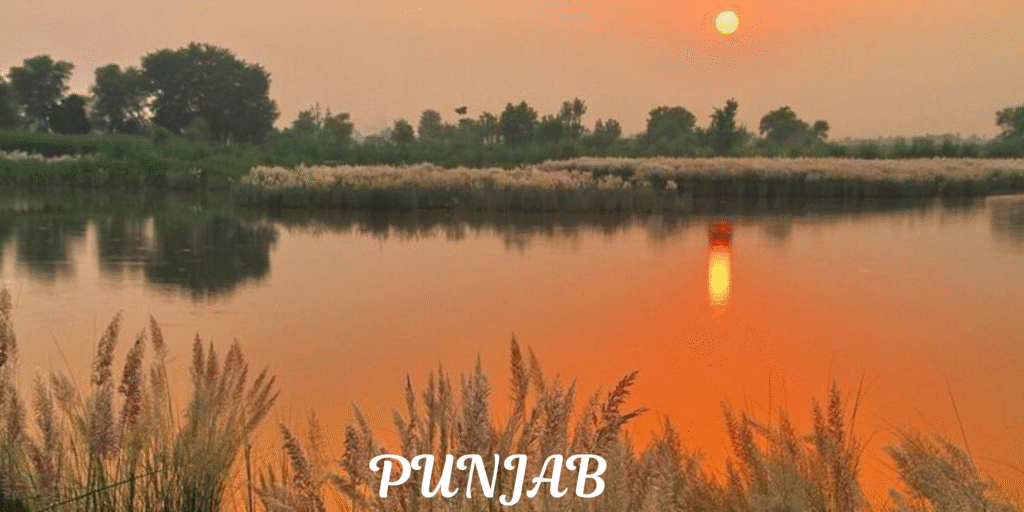
Why Visit Punjab?
Punjab is more than just a state — it’s a celebration of life, resilience, and joy. From the sacred calm of the Golden Temple to the roar of bhangra drums, from mustard fields swaying in sunlight to age-old forts echoing tales of valor — Punjab is India’s warmest hug and loudest welcome.
Whether you’re here for faith, food, freedom stories, or festivals, Punjab offers an experience rooted deep in heart and heritage.
Top Places to Visit in Punjab
Amritsar – Soul of Sikhism
Golden Temple (Harmandir Sahib): The holiest Sikh shrine, glowing with spiritual energy and architectural beauty
Jallianwala Bagh: Site of colonial-era massacre — a hauntingly powerful memorial
Wagah Border Ceremony: A patriotic, high-energy spectacle at India-Pakistan border
Don’t miss Amritsari kulchas, lassi, and langar at the Golden Temple
Patiala – Royal Pride
Home to Qila Mubarak, Sheesh Mahal, and traditional Patiala salwars
Known for heritage, polo, music, and of course — the Patiala peg
Great for a taste of old-world Punjabi royalty
Jalandhar – Culture Meets Commerce
One of Punjab’s oldest cities — now a modern hub
Visit Devi Talab Mandir, Pushpa Gujral Science City, and local sports manufacturing units
Ideal for culture lovers and tech meets tradition
Ludhiana – Urban Pulse & Textiles
Known for shopping, cycle manufacturing, and vibrant culture
Visit Punjab Agricultural University Museum for insight into rural life
A great pitstop for those wanting to explore city and village sides of Punjab
Anandpur Sahib & Ropar
Sacred Sikh town — birthplace of Khalsa Panth (Sikh brotherhood)
Attend Hola Mohalla festival — martial arts, kirtan, and traditions
Nearby Ropar Wetland for eco-lovers and birdwatchers
Religious & Heritage Sites
| Place | Significance |
|---|---|
| Golden Temple, Amritsar | Sikhism’s holiest site |
| Anandpur Sahib | Birthplace of Khalsa |
| Durgiana Temple, Amritsar | Hindu shrine with Golden Temple architecture |
| Gurudwara Fatehgarh Sahib | Honoring the martyrdom of Guru Gobind Singh’s sons |
| Sheesh Mahal, Patiala | Royal museum with frescoes & artifacts |
Best Time to Visit Punjab
October to March: Pleasant weather for travel & sightseeing
April to June: Hot but festive (Baisakhi celebrations)
July to September: Lush fields & village life (can be humid)
Where to Stay
| Type | Cities/Regions |
|---|---|
| Budget | Amritsar (around temple), Ludhiana |
| Mid-range | Patiala, Jalandhar, Farm stays |
| Luxury | Hyatt Amritsar, Neemrana Patiala, heritage havelis |
Want the real Punjab? Try a rural homestay or farm stay — with tractor rides, homemade food, and desi hospitality.
What to Eat in Punjab
Amritsari Kulcha & Chole – crisp, buttery, spiced to perfection
Makki di Roti & Sarson da Saag – winter’s favorite combo
Lassi – sweet, thick, and topped with malai
Butter Chicken & Tandoori Dishes – born in Punjab
Kadha Prasad – sacred, sweet semolina served at Gurudwaras
Pro Tip: Most food is cooked in ghee, served with love, and never low-calorie. 😄
Culture, Music & Festivals
Baisakhi (April): New harvest year, Gurdwara prayers, bhangra everywhere
Lohri (Jan): Bonfire nights, folk dances, and revdi
Hola Mohalla (March): Sikh warrior celebration
Giddha & Bhangra: Dance not just of celebration — but identity
Punjabi Folk Music: Dhol beats, tumbi twangs, and lyrical richness
Suggested 5-Day Itinerary
Day 1: Arrive in Amritsar – Golden Temple, langar, Jallianwala Bagh
Day 2: Visit Wagah Border → Gobindgarh Fort → Street food & shopping
Day 3: Drive to Patiala – explore Qila Mubarak, Sheesh Mahal, try local shops
Day 4: Travel to Anandpur Sahib → Ropar Wetlands
Day 5: Village life experience – tractor ride, mustard fields, traditional cooking class
Travel Tips from AzaadiRoutes
Cover your head inside Gurudwaras (scarves usually provided)
Be respectful of local customs — Punjabis are hospitable but traditional
Try local transport like rickshaws or rent a car for village drives
In villages, don’t be surprised if you’re offered fresh milk, gur, or sugarcane
Punjab is very safe and known for warm hospitality
From AzaadiRoutes:
“Punjab doesn’t whisper its stories — it sings them.
In every dhol beat, every field of gold, and every bowl of sarson da saag,
you’ll feel a homeland — even if it’s not your own.”
